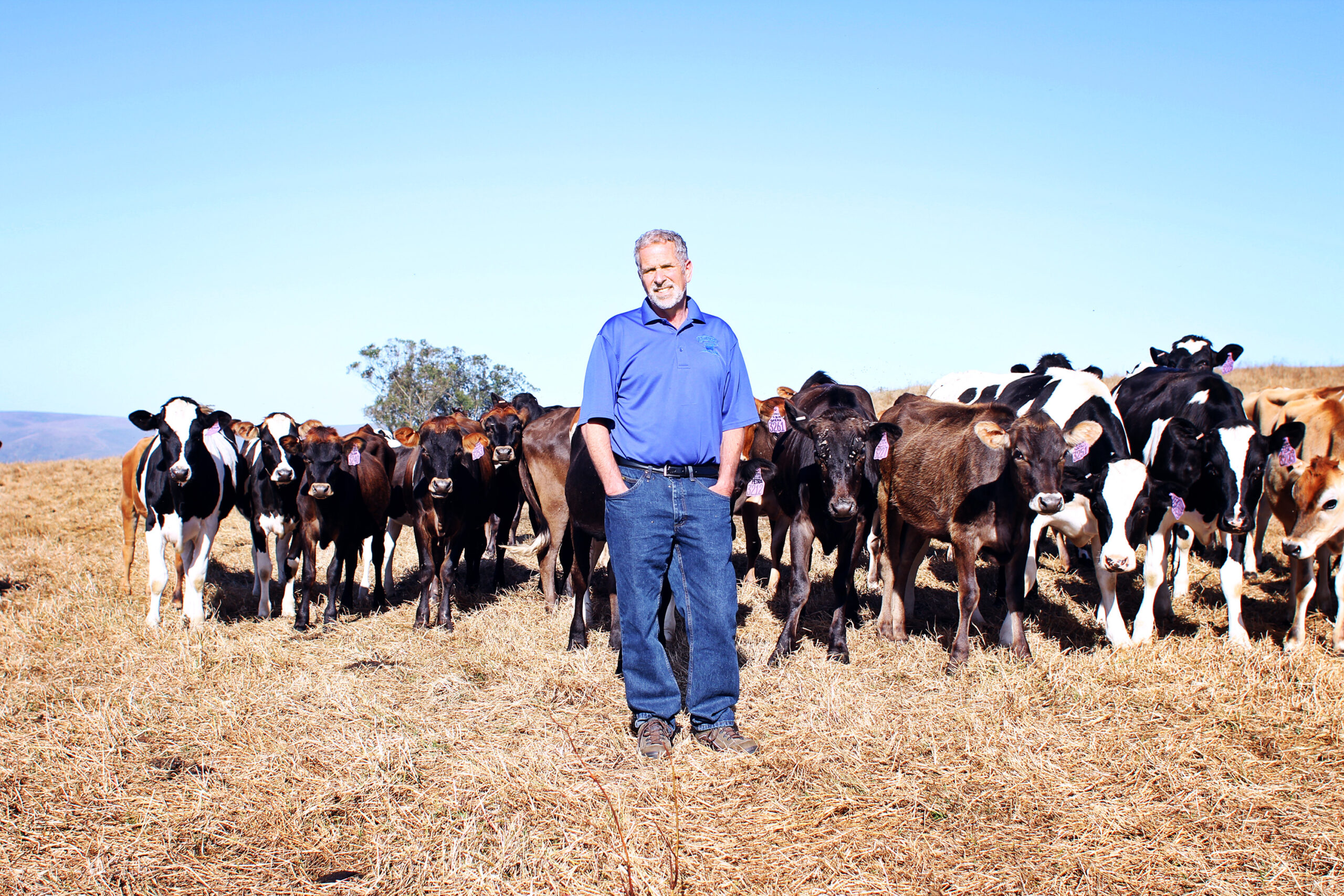
ALBERT STRAUS, STRAUS FAMILY CREAMERY
Our mission as a creamery is to help sustain family farms through producing high-quality, minimally processed, no-additives dairy products that support livelihoods in rural communities. We strive to be sustainable for us and for the landscape.
Q: You were one of the first demonstration sites for compost application and carbon farming. How did you hear about it and why did you decide to try it?
A: In 2008, we were approached by UC Berkeley as one of the baseline soil carbon test sites at the very start of the Marin Carbon Project. I’ve always been interested in understanding soil organic matter and carbon, because as an organic farm we are required to improve soils every year. I was interested in seeing how we could measure these different factors and understand our farm’s impact on the bigger picture of climate change.
Q: Since the original work, what have you gone on to do with carbon farming on your operation?
A: We now have a 20-year carbon farm plan that will reduce and sequester 2000 metric tons of carbon dioxide. A large portion of this, 80%, comes from our new biodigesters capturing methane, and 20% comes from soil health practices like adding compost, planting hedge rows and rotational grazing.
As we implement the plan, we track where we spread compost and manures and look at the increase in grass production on these sites. We want to quantify this monetarily for farmers so that they can understand how they save money growing more grass and reducing their purchase of outside feed.
Editor’s note:
In 2013, the Straus Dairy Farm became the first dairy farm in California to develop a carbon farm plan, in conjunction with the Marin Carbon Project. This was a 20-year carbon farm plan that was updated in 2020 with experts from the Marin Resource Conservation District and the Marin Agricultural Land Trust.
The updated 20-year carbon farm plan outlines how the Straus Dairy Farm has the potential to reduce its carbon footprint by 1,380 metric tons of CO2e every year. There is potential to annually reduce more than 780 metric tons CO2e of methane-rich manure emissions with the methane digester and to sequester up to 594 metric tons of CO2e every year through regenerative land practices.
On the energy side, we are looking at a pay-as-you-save-type model with Marin Clean Energy where a dairy farmer could put savings from energy costs into a revolving loan fund, without putting the burden of debt on the farm and without having to be a power plant operator. With the Carbon Farm Plan I was really able to understand the potential solutions to climate change and sustaining family farms through the same strategies.
Q: Are you seeing economic benefits from the practices?
A: We have some data showing increased yields from carbon sequestration practices, and the compost also adds nutrition for the crops and increases yields. We are looking at satellite imagery to measure dry matter coming off our pastures. This helps us plan and direct our operation. We are seeing savings on feed and energy costs (electricity and hot water), and we are able to take better advantage of our pastures and waste products to create a more viable farming system.
Q: Would you recommend carbon farming to other operations and why?
A: Yes, I’d recommend going through the process of developing and implementing that plan. It helps farms be more sustainable financially and look out for the bigger picture. In my mind, organic livestock operations are a very important solution to climate change, both dealing with our methane and using the animals to help sequester carbon.
Albert Straus continues to be a leading innovator in the north coast dairy community, in 2017, completing the first full-scale electric truck to feed cows that is completely powered by the cows’ waste.
Operating since 2004, the farm’s methane digester provides enough renewable energy to power the entire dairy farm, charge Albert Straus’ electric car and other farm vehicles. In 2019 through California’s Low Carbon Fuel Standards Program, Straus Dairy Farm and BMW Group’s collaboration created a new farm-to-electric pathway. Together, they are offering low carbon charging for BMW’s electric vehicle (EV) customers in California, allowing EV drivers to “source” a cleaner charge from electricity generated at an organic dairy farm. Watch video here.
If you are an agricultural producer or landowner seeking assistance in development of a Carbon Farm Plan (CFP), contact your local RCD or NRCS office.


